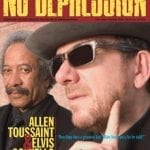David Mead – Tangerine Schmangerine
Even when it’s true, songwriters are often loath to admit they had a template in mind when making an album. For his latest effort, however, David Mead is quick to say he looked to Harry Nilsson’s 1971 classic Nilsson Schmilsson for guidance. Titled Tangerine, Mead’s new album revels in the sort of eclectic spirit and sophisticated pop that Nilsson and others gravitated toward in the immediate post-Beatles era.
“I was getting a bit worn out on traditional song structures,” Mead explains. “I wanted to mess around with that and see if I could go someplace where the inherent pop aspect of what I do wasn’t lost, but where there was a bit of a twist to it. Nilsson Schmilsson was definitely an inspiration. I like the way that album hops around, and I like how it sounds as though everyone was having a great time. Plus, Nilsson is such a fringe character. I really identified with that.”
Crafting great pop songs is nothing new to Mead. Beginning with his 1999 debut The Luxury Of Time, he has released four full-length albums packed with exquisite melodies and primed with a subtle theatrical flair. Currently based in Nashville, where he spent his formative years prior to a lengthy stint in New York, Mead has garnered comparisons to Rufus Wainwright and Ron Sexsmith, for both his songwriting skills and his mellifluous voice. Though formally trained, Mead says he didn’t hit his stride as a vocalist until he happened upon an EP by Jeff Buckley.
“I had some excellent instruction when I was 19 years old,” he says, “but it was a method that was hard for me to adjust to at the time. I kind of got halfway there and then dropped the lessons. Then, about two years after that, I heard Buckley’s Live At Sin-e. I had never heard a man sing like that and sound cool in the process. I wanted to sing along with it, and I found that the only way I could do that was to sort of slip back into these methods I had been taught. It just blew everything wide open. That one record, combined with my teacher’s instruction, probably added two octaves to my range.”
Mead uses that range to great effect on Tangerine. After kicking off with an all-instrumental overture, the album settles into a leisurely mix of sprightly-arranged pop, lightly orchestrated balladry, and (in the case of “Reminded #1”) an almost a cappella rendering of a torch song. High points include the soaring, cinematic “Suddenly, A Summer Night”, a soul-pop ditty titled “Chatterbox” that evokes solo Alex Chilton, and a carnivalesque gem called “Hard To Remember” that’s a dead ringer for Nilsson.
Mead says the album’s themes and its style were affected by two factors: his recent marriage, and his desire to accommodate his quirkier notions in regard to arrangements. “Usually my writing is driven more by some sort of heartache or need,” he says. “This time I wanted to make a record that explored the underbelly of being happy. Life’s been good of late and I’m still coming up with music, so I figured there must be a point to this. I was thinking there must be something here that people will relate to, as opposed to sort of striking the pose of someone who’s under stress and turmoil.”
Producer Brad Jones was crucial to the effort as well. “I had a pretty good idea of what I wanted the record to be, as far as the music goes,” Mead says. “But I wasn’t sure I had the courage to realize that, at least to its fullest extent. In that sense, Brad was the perfect guy. He played a lot of the instruments, but more importantly he pushed me to play a lot of instruments. He believed if I would just extend myself in that way, the songs would have more of a unique signature.”
As with Mead’s previous albums, much of the material on Tangerine has a musical-with-a-capital-M component, an influence he ascribes to a childhood background that included singing in local stage productions and attending boisterous church services. He also cites U2 as his first favorite band, the implication being that a touch of grandeur is not necessarily a bad thing. Mead says he prefers simplicity in his career (“I want to keep things small and focused and enjoy it,” he allows), but he rejects what he calls “the soundbite way in which we’ve been conditioned to think.”
“I’m not afraid to embrace scope,” he says. “I don’t think everything has to be a tiny little vignette. Between liking U2 and seeing these southern, kind of rock ‘n’ roll church services…that’s why I wanted to play music.
“We’ve lost that idea that you can just have an emotion and believably break into a song about it. I think there’s still a place for that — not in a nostalgic way, but in a present way, where it’s OK to acknowledge your happiness. It’s about emotional and spiritual transcendence, as opposed to some hard-edged reality.”




